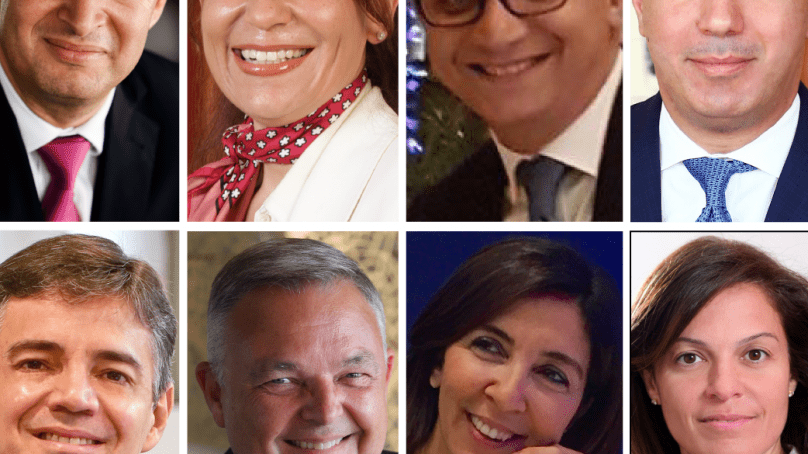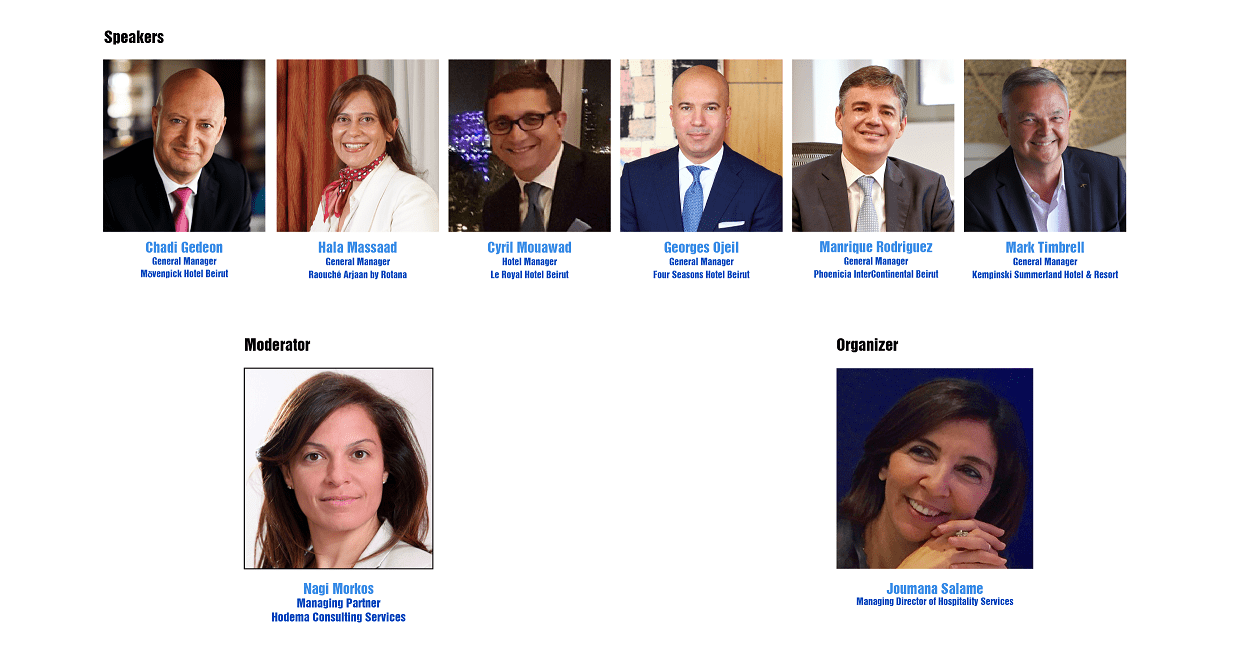Powered by Hospitality News Middle East and funded by the USAID Lebanon Enterprise development (LED) project, Hospitality News Talks held its eighth virtual roundtable on March 31 — “Lebanon’s general managers discuss challenges and the changing hospitality landscape.” The online session, one of 12 such talks moderated by Hodema consulting services, invited hoteliers from some of Lebanon’s top properties to share their experiences and suggest ways in which tourism could be supported during these immensely uncertain times.
The panel included: Chadi Gedeon, GM of Mövenpick Hotel Beirut; Hala Massaad, GM of Raouché Arjaan by Rotana; Cyril Mouawad, hotel manager of Le Royal Hotel Beirut; Georges Ojeil, GM of Four Seasons Hotel Beirut; Manrique Rodriguez, GM of Phoenicia InterContinental Beirut; and Mark Timbrell, GM of Kempinski Summerland Hotel & Resort. Nada Alameddine, partner of Hodema Consulting Services, moderated the session.
Rodriguez spoke about the obstacles Phoenicia InterContinental Beirut is currently facing, the greatest of which has been dealing with the aftermath of the Beirut Port explosion. “The aluminum and glass of every single room was damaged, and the hotel is undergoing a major renovation. We are aiming to reopen the first tower in mid June, but the opening will be dictated by many factors: the speed of construction, the political situation, and so forth.”
The veteran hotelier added that Lebanon’s tourism landscape has changed and will continue evolving. “Lebanon has become a very affordable destination, so we hope that this will encourage a different type of clientele to our shores — people who may not have considered coming before and those who could have felt it was too expensive.”
Rodriguez added that adaptability is key and that hotels must find a way to cater to new markets as well as making sure that all the right protocols are in place. He also pointed out that the country must be “ready” to welcome tourists when the time comes. “By the time we recover from Covid-19, we have to be sure that that we are running a clean city, the government is formed and the right conditions exist for the industry to flourish again. This is essential.”
Representing the Four Seasons Hotel Beirut, another property that is under complete refurbishment due to the port blast, Ojeil explained how survival has been governed by the ability to adapt. “We have not only dealt with an explosion and a pandemic; we have also been impacted by socio-economic and political crises.”
Despite large-scale damage to the Four Seasons Hotel Beirut and uncertainties on a macro level — it is unlikely to open before Q1 or Q2 2022 — Ojeil sounded hopeful about the future and the country’s ability to bounce back. “I am confident that we will rise stronger than ever. We can’t keep looking back; we need to change the way we are and how we do business. I am a firm believer that opportunity lies in every crisis.”
He also discussed the importance of investing in human capital and nurturing the next generation of hoteliers. “Capitalizing on local talents is fundamental, and we can do this by focusing on graduates and supporting them. They are our future.”
Timbrell spoke about the various initiatives the Kempinski Summerland Hotel & Resort has adopted to mitigate Covid-19 transmission. “Our White Gloves service standards are very strict, and we have implemented protocols to protect our guests and our staff. In-room amenities have changed — masks, sanitizers and other hygiene products are commonplace. We also have regular PCR testing and encourage our team members to stay at home on full pay if they are feeling unwell.” He said that offering reassurance and putting the health and safety of employees and guests first is what matters most these days.
The GM expressed confidence about bookings picking up over the coming months, especially given the fact that the Kempinski is a resort hotel and offers plenty of facilities. “We are effectively a village in a city. The summer is our peak period. The second half of June 2020 was incredibly busy for us due to travel restrictions and demand from the local market. We already have bookings coming in, and we are working on some exciting things in the pipeline, including hybrid weddings.
Timbrell praised the commitment of the Kempinski team during these unusual and difficult times and mentioned some of the ways in which HR has stepped in to support employees. “A high-cost-of-living allowance was implemented to help staff financially, and we also introduced “My Basket,” an initiative allowing our team to purchase goods through the hotel at wholesale price.”
Gedeon stated that the economic crisis has made it virtually impossible to retain expats. “We are missing some of our executive team members, such as the executive chefs, because we cannot pay their salaries in dollars.” The GM listed some of the ways it has been possible to make savings. “The use of local products in F&B, a profit protection plan and adjusting our manning without compromising on quality are just some of the things we have focused on.”
Gedeon spoke about the high demand Mövenpick Hotel Beirut, a resort property, had witnessed last summer. “The hotel occupancy was high in summer 2020. We benefited from the Lebanese diaspora coming home for the holidays and from domestic tourism. In fact, we created packages for locals.”
He said that one of the greatest challenges today concerns pricing, because customers are constantly looking for cheaper options and negotiating more. “The market is driven by room rate and not by category, so coordination between hotels is important to ensure the number of categories are limited.”
Massaad spoke in detail about human resources and the struggles her staff is facing because of the financial situation. “Over 30 percent of our colleagues are asking to leave. We are trying our best to retain good staff. At our property, 70 percent of the employees are not looking for a career; they are just looking for jobs and a means to survive.” The GM stated that many employees live over 40 minutes away from the hotel, and transportation is becoming more expensive. The hotel took the decision to allow some staff to sleep at the hotel to avoid traveling back and forth. She added that monthly salary increments are being provided and money advances are offered where necessary, as there are numerous socially sensitive cases.
In addition, Massaad tackled the topic of guesthouses and their role in the market. “Guesthouses are taking a portion of our business, especially many offer high-quality services. They are also known for being more “authentic,” so we attract a different clientele entirely.” She said that in 2020, the decrease in occupancy rates at Airbnb properties was less than that of the city hotels.
Finally, Massaad recommended that the tourist dollar is applied as a special rate for hotels and to ask foreigners to settle their room bills in foreign currency. “We tried to get in touch with the syndicate, but we did not reach an agreement. It’s a double-edged sword — suppliers want to be paid at the daily black market rate, yet our guests are paying lower rates. International tour operators want to be paid in dollars.”
As hotel manager of a property outside central Beirut, Mouawad said that the surge in staycations had a positive impact on occupancy rates. “Because of the pandemic and other factors, many Lebanese have been unable to travel. We therefore witnessed higher demand from the local market, especially for our larger rooms and suites, and an increase in long-stay bookings.” He added that F&B also adapted by teaming up with Toters and creating a delivery menu. This kept the kitchen busy while the restaurants were closed.
Besides the challenges of Covid-19 and fulfilling the “Royal Clean Pledge” as well as other hygiene practices to safeguard the health and safety of guests and staff, Mouawad discussed the financial pressures and how problematic it has become to work on rates. “Online pricing is particularly complicated, because you have to abide by the official 1,500 LBP to USD rate. This means that the online room rate might be displayed as 800 USD, when in fact it is much lower on the actual billing rate.”
The GM appeared optimistic about the forthcoming season. “We are expecting many Lebanese expats to come to Lebanon this summer. The vaccine rollout will certainly help, and it is now even more affordable. I wouldn’t be surprised if we see occupancy rates around 70 percent,” he added.
The panelists agreed that there is a reason to be hopeful, noting that Lebanon has a proven record of successfully bouncing back from adversity. They believed that many Lebanese living abroad will come to spend their summer holidays in Lebanon, and demand will also come from locals who do not wish or might not be able to travel overseas.
There was also a consensus that pricing for the sector must be adjusted to reflect the devaluation of the Lebanese pound. All the panelists emphasized the tourist dollar and the importance of encouraging foreigners to pay in USD, similar to Turkey and Egypt. They said that this requires coordination and unity among stakeholders. Hotels must stick together and work closely to overcome the hurdles.
Furthermore, they talked about local talents and the role of educators and academic institutions to nurture and inspire Lebanese hoteliers of the future. Lebanon has always been admired for its skilled labor force, and thus it is imperative for hotels to also invest in human capital by offering trainings that build skills and motivate.
The webinar can be viewed in full here.
The ninth webinar, “Changing perceptions: what Lebanese bloggers and influencers are doing to promote Lebanon,” will take place on April 8.. Click here to register.
To access the full program of Hospitality News Talks webinars, click here.












